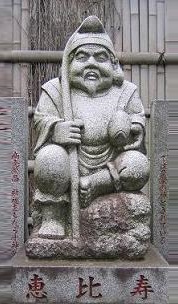Ebisuten is one of the deities (fukunokami) of the Seven Lucky Gods of Japan (Shichifukujin); the other six being:

Ebisuten is the patron deity of fishermen and favours them with a good catch. He also ensures safe journeys for all seafarers since he himself arrived in Japan from the sea.
Unlike the other six shichifukujin who arrived in Japan from overseas Buddhism, Daoism and Hinduism, Ebisuten is 100% Japanese.
He is the child of Izanagi and his sister-wife Izanami, the creators of the Japanese archipelago and the forbearers of many deities, including the sun goddess Amaterasu. Born deaf, with neither arms nor legs, he was thrown into the waves to perish. Myths follow how sea creatures took care him until he floated ashore on the northern island of Hokkaidō where he was looked after by a kind Ainu family while his limbs grew.
Due to his parentage, remarkable survival and development, by the age of three he was considered a god and was named Ebisuten. Not only the god for seafarers but also farmers have adopted him to guard their rice fields. His patronage is now extended to the wider food and drink industry, clothing brands and even sports teams.
His mark is a large fish; usually a red sea-bream (tai), carp (koi), cod (tara) or sea bass (suzuki). The fish either dangles from a rod in his right hand or is carried under his left arm. Fugu restaurants of Japan often use images of Ebisuten in their signboards and menu cards.
Ebisuten has a cheerful smile behind his neat beard and wears a pointed cap (kazeori eboshi). Ebisuten and Daikokuten are often depicted together in statues, paintings and carved sculptures, and are the two most popular of the seven gods.
Ebisuten is the only fukunokami who is purely Japanese, and even has his own railway stations!
He graciously allowed his name to be used by a brewery for their product Yebisu which they wanted to be associated with something both auspicious and pure Japanese.
The brewery was a major employer and the district became known as Ebisu. It is now upmarket area in Shibuya, Tokyo, and his statue outside the Ebisu railway station is about three kilometres from Tokyo Bay.
In addition to the Ebisu railway station in Tokyo, there's an adjacent Ebisu subway station, and between them they serve around 250,000 passengers a day.
About 550 kilometres to the east is another Ebisu railway station near Kyoto. It's a delightful countryside station, serving about 600 passengers a day, lagging way behind the capital's bustle, yet has a more impressive statue of Ebisuten at the entrance, holding up his fishing rod and red sea-bream.
That's only 15 kilometres from Osaka Bay, though as with his city home near Tokyo Bay, there's no recorded sighting of him actually fishing.
Yebisu is pronounced in the same way Ebisu, where the "e" and "i" are short as in "bed" and "bit", and the terminating "u" is usually silent.
The denim brand Evisu is pronounced (in Japan) the same as Ebisu, since there is no "v" sound in Japanese, "b" is the closest pronunciation.
The other stations are Hotei, north of Nogaya, and Bishamon in Aomori.
Other stations sort-of carry the name of other fukunokami, such as Daikokucho and Bentencho stations in Osaka.